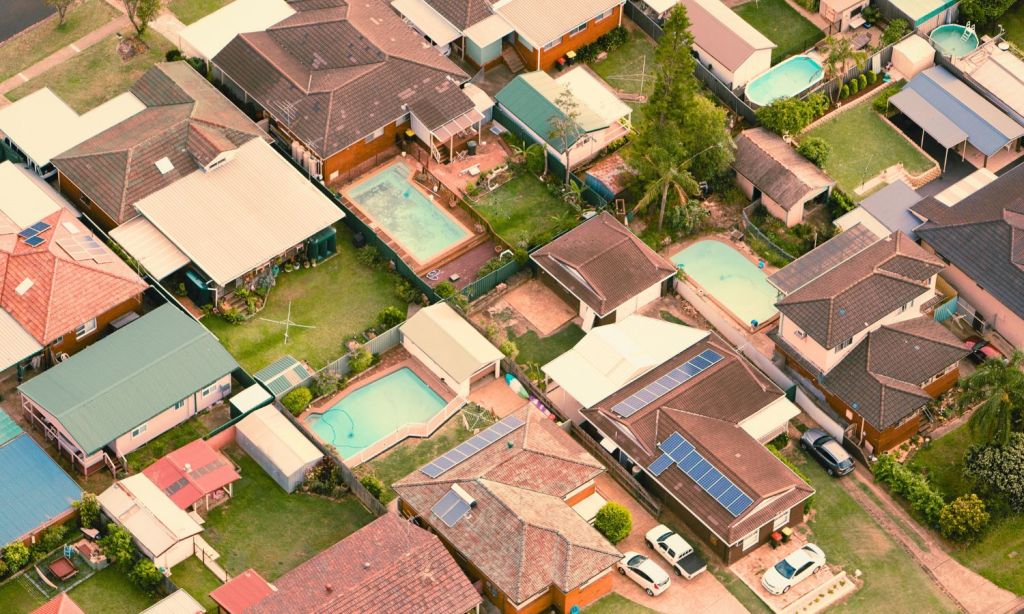The country’s largest construction union is calling on the government to implement a new super profits tax on major corporations in order to fix the housing crisis.
Zach Smith, the new national secretary of the Construction, Forestry, Maritime, Mining, and Energy Union (CFMEU), has used his speech at the National Press Club on Tuesday to call for a 40% tax on excess profits.
“The wealth exists … It exists in the profit columns of a very small and very elite group of corporations. And we just have to funnel just a portion of it in the right direction,” Smith said.
The CFMEU is the largest donor to the Labor Party. Their argument is that the money would “comfortably” cover the cost of 75,000 new social and affordable homes.
It’s been pretty well established that the quickest way to fix the housing crisis is to build more houses. More specifically, cheap, high-quality, affordable housing. It’s how Australia solved a similar housing crisis in the post-war era.
The government is currently locked in a battle with the Greens over housing policy. Labor are trying to get an election campaign promise of 30,000 new social and affordable homes through Parliament, but the Greens, who hold the balance of power in the Senate, are demanding they do more.
The latest call from the CFMEU is only likely to inflame tensions as the nation deals with an increasingly unlivable housing situation.
“Not only can government step in to fix big, intractable national problems – it must,” Smith has said. “The state has a role to play, and Australians want the state to play it.”
The union has commissioned Oxford Economics Australia to analyse how such a tax would impact housing construction. The report says that a “permanent 40% tax on excess profits” on mining projects and non-mining companies with turnovers above $100 million would generate an additional $29 billion each year.
According to the research, Australia is expected to have a shortfall of 750,000 social and affordable homes by 2041. The deficit will drive up the housing crisis and inflate the cost of property further, while current plans don’t come anywhere near plugging the gap. Smith has said that the money would be able to fund the construction of 53,000 new homes each year, enough to correct this imbalance.
“Our economy is meant to serve our society. But it is failing on a fundamental level,” Smith has said.
“Millions of Australians are worried about their capacity to afford the most basic of human needs. And this failure is not one of wealth. Australia has plenty of money.
“But we do need to move more boldly than we’ve done for a while. We need big structural reform aimed at a serious long-term fix.”
Tax reform has been proposed before as a means of solving the housing crisis. Whether it will actually work is another matter. Here’s what you need to know.
A Super Profits Tax to Fix the Housing Crisis?

Australia’s housing crisis has been bad for a while. From all angles, industry bodies and senior figures scream drastic solutions while the government seems to simply plod along.
Drastic issues require drastic measures and yet it doesn’t seem that those in power are treating the situation as such. This is despite the fact that the UN critiqued Australia for its housing affordability on a human rights basis back in 2006.
Building more houses is certainly the most logical option, assuming that houses can even get built. Right now, we have soaring construction costs, planning laws choked with red tape, and a tax system that disincentivises sales.
All of that aside, assuming we can actually build the things, as the CFMEU does, then there are a number of issues we have to overcome. Namely, getting them into the hands — or over the heads — of the right people who need them most.
Australia treats property like a financial investment first and foremost and as a basic need to be delivered to all somewhere at the bottom of the list. There is no guarantee that simply by building more houses, we won’t just be creating greater opportunities for investors to snap up property for rentals.
In certain parts of the US, where the housing crisis is worse than it is in Australia, there is a YIMBY movement – the opposite of NIMBYS, who reject housing development in their areas. In places like Atlanta, where vast ‘global city’ projects have been undertaken to attract new investment and remodel the area to increase livability, a lack of housing protections has resulted in greater racial segregation. As the city built more houses, it destroyed others, creating apartment complexes that pushed the original inhabitants further out of the area.
“Policymaking that brings new housing without protecting current residents is the basic engine of gentrification,” writes journalist Michael Friedrich on the issue in the US.
Experts in Australia agree that such policies have to be undertaken with care. Professor Nicole Gurran from the School of Architecture, Design and Planning at the University of Sydney has written that simply building more houses isn’t a silver bullet.
“In countries like Australia, an overall increase in housing units hasn’t improved affordability at the bottom of the market,” Gurran has written.
This is because housing is bought by wealthy people for investments, the rental market, or second or third homes. It could also be because the housing has not been created in the places it’s needed most.
“New supply will only moderate prices if it is both cheaper than other properties in the market and a suitable substitute for households looking to relocate,” Gurran continues.
“For instance, new apartments on the city fringe will not impact house prices in inner-ring suburbs, which are more accessible to employment opportunities”.
For the CFMEU, their calls are specifically on this issue. Smith, in his speech, stresses the need for “affordable” housing. Simply building is not enough; we need to ensure it is built where it’s needed, and protections are put in place to ensure those who need it get it.
This conversation is not going away any time soon. The CFMEU will be launching a national campaign calling on Labor to create a super profits tax to fix the housing crisis. Adverts are expected to appear across the country with their messaging.
When Parliament returns, Labor’s $10 billion Housing Australia Future Fund will be brought to the Senate for debate in October. As the Greens are standing firm on their demands for a rental freeze and more money for affordable housing, the government will be fighting on all fronts if the unions begin to turn on them too.
“This reform could end homelessness in Australia, it could boost productivity, it could lift millions out of poverty and distress,” Smith said.
“I know we’re not used to thinking this big anymore, but there’s such a strong appetite out there for an idea like this one.”
Related: The Greens Are Pushing for a Rent Freeze But Will It Actually Solve the Housing Crisis?
Read more stories from The Latch and subscribe to our email newsletter.







